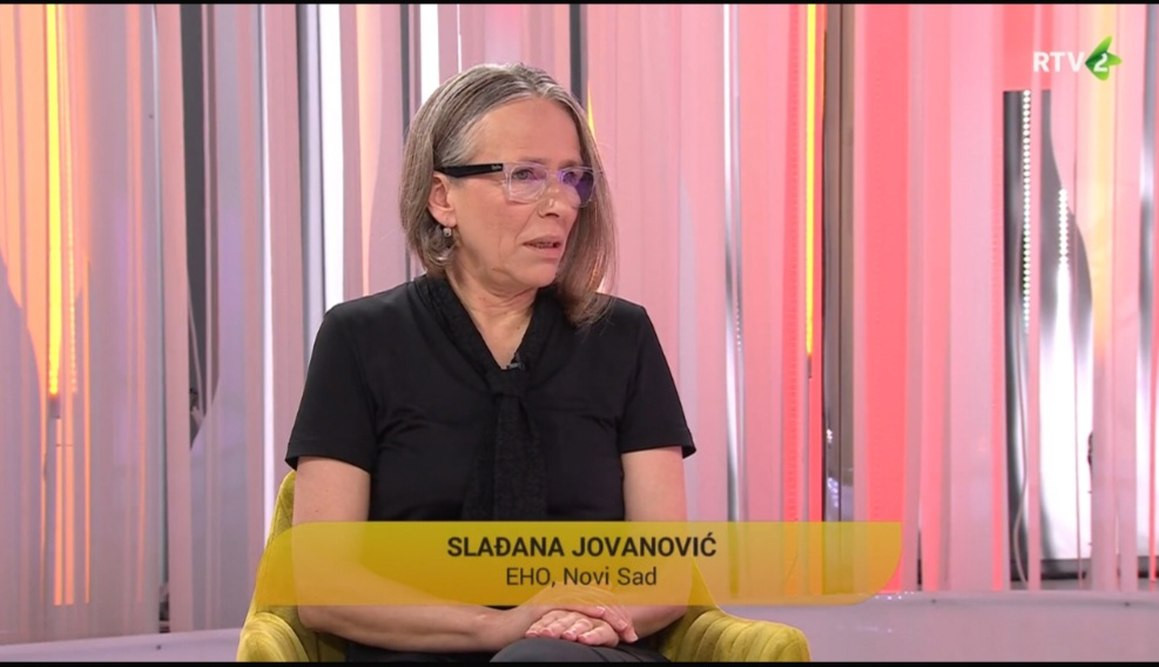Guest appearance on RTV2: Slađana Jovanović, coordinator of the EHO project, on Roma inclusion, the fight against discrimination and the importance of education

14. Aug 2025.
The Ecumenical Humanitarian Organization (EHO) presented its four-year project "Social Inclusion for a Dignified Life of Roma and Other Vulnerable Persons in Serbia 2023–2026". This project is being implemented with the support of the Swiss organization HEKS/EPER, and its goals and activities were discussed by Slađana Jovanović, project coordinator, during a guest appearance on the show 'Kulturako aresipe' on RTV2.
During her visit, she emphasized that the work of the Ecumenical Humanitarian Organization is primarily focused on people belonging to vulnerable and marginalized groups whose human rights are violated and/or are exposed to discrimination. EHO's work includes children and young people, people with disabilities, the elderly, refugees and migrants, Roma, people with health problems, rural populations, the unemployed, girls and women.
The topic of the discussion was the presentation of a project that aims to contribute to poverty reduction through non-discriminatory, sustainable and socially responsible inclusion of the most vulnerable members of the Roma community and other marginalized people living in substandard conditions. The project is being implemented in cooperation with seven cities and municipalities – the city of Niš, the city of Kragujevac, the municipalities of Velika Plana, Kovin and Beočin, as well as the city municipalities of Zvezdara and Voždovac. Slađana Jovanović emphasized that discrimination and the fight against Gypsyism are recognized as one of the most important areas of work within this project.
In addition, she also referred to education as another key component, within which children are supported to continue their education and build a dignified life. The third area of the project relates to supporting families from poor backgrounds and living in illegally constructed buildings, to provide them with a legally secure home and access to basic infrastructure without discrimination. This closes the circle that leads again to the fight against discrimination, because it is precisely legal invisibility that often generates further exclusion.
In her presentation, she particularly emphasized the importance of involving young people and children as agents of change, stating that children were recognized as the strongest effect of the project. As part of the work with peer educators against discrimination and violence from partner schools, five video scenes were recorded in order to make the situations that young people face every day more visible. Through these video materials, children show how people in their immediate environment behave and how they can behave differently, without violence and discrimination. RTV2 also showed these scenes during the show itself. In the coming period, the video materials will be shown to children from elementary schools and discussed in focus groups about the topics they cover.
Jovanović particularly emphasized how important it was that the children had the support of their parents during the implementation of the activities, as well as that the filming process was challenging and full of adjustments. In this context, she also emphasized the importance of the media, because such guest appearances raise the activities to a higher level, and the messages reach the wider public. She also underlined the role of pedagogical assistants who represent a key support for children, precisely because of the closeness and trust they build with them. In addition to them, the support of teaching staff in schools is also important, especially when it comes to encouraging children to react to discrimination and violence.
The project is implemented in seven partner schools, mostly in rural areas, and the recorded videos are shared with other schools, further expanding the impact. Through small school projects supported by the organization, more and more schools are turning to the fight against discrimination, thereby strengthening local communities and promoting a culture of equality and respect for diversity.
You can watch the entire show at the following link: https://media.rtv.rs/rom/kulturako-aresipe/102634
Notice: the video is in Serbian language, withour captions/subtitles